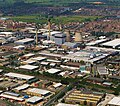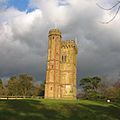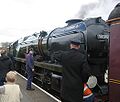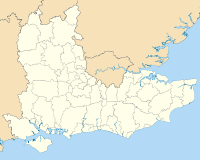Portal:South East England
The South East England Portal

South East England is one of the nine official regions of England in the United Kingdom at the first level of ITL for statistical purposes. It consists of the counties of Buckinghamshire, East Sussex, Hampshire, the Isle of Wight, Kent, Oxfordshire, Berkshire, Surrey and West Sussex. Major towns and cities in the region include Brighton and Hove, Canterbury, Milton Keynes, Southampton, Portsmouth, Slough, Reading and Oxford.
South East England is the third-largest region of England, with a land area of 19,072 square kilometres (7,364 sq mi), and is also the most populous with a total population of over nine million. The region contains eight legally chartered cities: Brighton and Hove, Canterbury, Chichester, Milton Keynes, Oxford, Portsmouth, Southampton and Winchester. The region's close proximity to London has led to South East England becoming a prosperous economic hub with the largest economy of any region in the UK, after London. The region is home to Gatwick Airport, the UK's second-busiest airport, and Heathrow Airport (the UK's busiest airport) is located adjacent to the region's boundary with Greater London. The coastline along the English Channel provides numerous ferry crossings to mainland Europe.
The region is known for its countryside, which includes two national parks: the New Forest and the South Downs, as well as the North Downs, the Chiltern Hills and part of the Cotswolds. The River Thames flows through the region and its basin is known as the Thames Valley. It is also the location of a number of internationally known places of interest, such as HMS Victory in Portsmouth, Cliveden in Buckinghamshire, Thorpe Park and RHS Wisley in Surrey, Blenheim Palace in Oxfordshire, Windsor Castle in Berkshire, Leeds Castle, the White Cliffs of Dover and Canterbury Cathedral in Kent, Brighton Palace Pier, and Hammerwood Park in East Sussex, and Wakehurst Place in West Sussex. The region has many universities; the University of Oxford is the oldest in the English-speaking world, and ranked among the best in the world.
South East England is host to various sporting events, including the annual Henley Royal Regatta, Royal Ascot and The Derby, and sporting venues include Wentworth Golf Club and Brands Hatch. Some of the events of the 2012 Summer Olympics were held in the south east, including the rowing at Eton Dorney and part of the cycling road race in the Surrey Hills.
In medieval times, South East England included much of the Kingdom of Wessex, which was the precursor to the modern state of England. Winchester was the capital of England after unification of the various states, including the kingdoms of Kent, Sussex and Mercia. Winchester stopped being the administrative capital of England some time in the 13th century as its influence waned while the City of London dominated commerce. The last monarch to be crowned at Winchester was Richard II in 1377, although the last monarch to be crowned by the Bishop of Winchester was Queen Mary I in 1553. (Full article...)
Selected article
The history of Brasenose College, Oxford, stretches back to 1509, when Brasenose College was founded on the site of Brasenose Hall. Its name is believed to derive from the name of a bronze knocker that adorned the hall's door. The college was associated with Lancashire and Cheshire, the county origins of its two founders – Sir Richard Sutton and the Bishop of Lincoln, William Smyth – a link that was maintained strongly until the latter half of the nineteenth century. The first principals navigated Brasenose, with its Catholic sympathisers, through the reformation and continuing religious reforms. Most of Brasenose favoured the Royalist side during the English Civil War, although it produced notable generals and clergy on both sides. The library and chapel were completed in the mid-seventeenth century, despite Brasenose suffering continuing financial problems.
The post-1785 period would see an era of prosperity of the college under Principal William Cleaver. The college began to be populated by gentlemen, its income doubling between 1790 and 1810, and academic success considerable. Efforts to reconstruct Brasenose were not completed, however, until the second half of the century with the addition of New Quad between 1886 and 1911. Brasenose's financial position remained secure, although under the tenure of Principal Edward Hartopp Cradock Brasenose's academic record waned greatly, with much of its success focussed on sports – where it excelled most notably in cricket and rowing. The mid-Century Royal Commissions were navigated – although they were opposed in form, their recommendations welcomed including the submission of accounts. The election of Charles Buller Heberden as principal in 1889 led to a reversal in Brasenose's academic failures, although its sporting performance suffered. Heberden was the first lay principal, presiding over an increasingly secular college, opening up the library to undergraduates, instituting an entrance exam for the first time and accepting Rhodes scholarships.
Brasenose lost 115 men in the First World War (including a quarter of the 1913 year), with its undergraduate numbers greatly reduced. Lord Curzon's post-war reforms were successfully instituted. The inter-war period was defined by William Stallybrass, who as fellow and eventual principal (until 1948) dominated college life. Brasenose once again produced top sportsmen – cricketers, rowers, and others. This came at the cost of falling academic standards and poorly performing finances, which would see Stallybrass' authority challenged. He died in a railway accident before he could be forced out, however. After the war, sporting achievements waned (although there were notable exceptions) but academic success did not improve significantly, in what was now one of Oxford's largest colleges.
The 1970s saw considerable social change in Brasenose: the admission of women beginning in 1974, more post-graduate attendees and fewer domestic staff. There was also considerable construction work to ensure that undergraduates could be housed for the entirety of their degree on the main site and on the Frewin site; this task was only completed in 1997 with the opening of the St Cross Building and Frewin extension. Law continued to be a strong subject for Brasenose (following on from Stallybrass, through Principals Barry Nicholas and Herbert Hart) as was the emerging subject of Philosophy, Politics and Economics (PPE), starting with the fellowship of Vernon Bogdanor. Brasenose's finances were secured, and it thus entered the twenty-first century in a good position as regards financial, extracurricular and academic success – the last having significantly recovered from its lows, helped by PPE. (Full article...)
Selected pictures
Selected biography
Godric (died c. 1066) was the Anglo Saxon sheriff of Berkshire and possibly Buckinghamshire in the 11th century prior to the Norman Conquest.
The High Sheriff of Berkshire's chief residences were at Wallingford and Aldermaston. As a sheriff, Godric had the powers of arrest, he could raise armies, collect taxes and levies, and he presided over courts, dealt with traitors and generally supervised on the King's behalf everything that went on in the area of the Kingdom under his jurisdiction. It was recorded that Godric was "a colourful old scoundrel".
Godric had at least one daughter, who was taught gold embroidery by a maid called Aelfgyth in Oakley, Buckinghamshire before the Norman Conquest. Henry de Ferrers had acquired lands at Stanford in the Vale, Berkshire (now Oxfordshire) belonging to Godric the Sheriff, probably between 1055 and 1067. Finally, there is a mention of "Godric the Sheriff, of Fyfield (Berkshire, now Oxfordshire)" as being a member of King Harold Godwinson's forces at the Battle of Hastings in 1066. (Full article...)
On This Day in South East England
25 April:
1950: Drummer Steve Ferrone was born in Brighton.
Categories
Related portals
WikiProjects
Topics
Associated Wikimedia
The following Wikimedia Foundation sister projects provide more on this subject:
-
Commons
Free media repository -
Wikibooks
Free textbooks and manuals -
Wikidata
Free knowledge base -
Wikinews
Free-content news -
Wikiquote
Collection of quotations -
Wikisource
Free-content library -
Wikiversity
Free learning tools -
Wikivoyage
Free travel guide -
Wiktionary
Dictionary and thesaurus































































































































